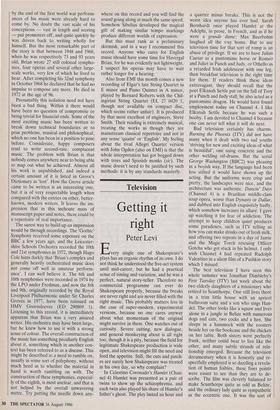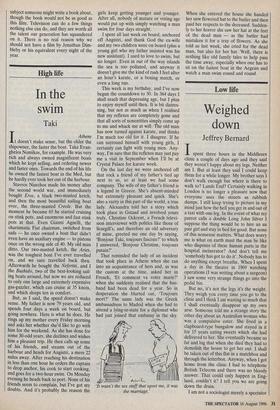Television
Getting it right
Peter Levi
Every single one of Shakespeare's plays has an organic rhythm of its own. I do not think he understood the five-act system until mid-career, but he had a practical sense of timing and variation, and he was a perfect, natural story-teller. Therefore no commercial programme can ever do Shakespeare properly, because the breaks are never right and are never filled with the right music. This probably matters less in the case of super-modern, experimental versions, because no one cares anyway about what momentum of the original might survive in them. One watches out of curiosity. Severe cutting, new dialogue, and general monkeying about is all right too, though it is a pity, because the field for legitimate Shakespeare production is wide open, and television might fill the need and feed the appetite. Still, the cuts and patch- es are surely how Shakespeare was treated in his own day, so why complain?
In Celestino Coronado's Hamlet (Chan- nel 4) Hamlet was presented as a pair of twins to show up the schizophrenia, and each twin also played his share of Hamlet's father's ghost. The play lasted an hour and a quarter minus breaks. This is not the worst idea anyone has ever had. Sarah Bernhardt once played Hamlet at the Adelphi, in prose, in French, and as if he were a grande dame; Max Beerbohm laughed all the way home. But to use television time for that sort of romp is an abuse of privilege. If we are to have Julius Caesar as a pantomime horse or Romeo and Juliet as Punch and Judy, or Othello as a retarded Irish adolescent with one leg, then breakfast television is the right time for them. If readers think these ideas extravagant, they should recall that the poet Elkanah Settle put on the fall of Troy at a Punch and Judy stall; he also acted as a pantomime dragon. He would have found employment today on Channel 4. I like Elkanah Settle because he was such a booby. I am devoted to Channel 4 because one can never tell what it will do next.
Bad television certainly has charms. Burning the Phoenix (ITV) did not have many when it dealt with two sad youths 'striving for new and exciting ideas of what is beautiful', one using concrete and the other welding oil-drums. But the serial George Washington (BBC2) was pleasing in a boyish way. If the language had been less stilted it would have shown up the acting. But the uniforms were crisp and pretty, the landscapes were nice, and the architecture was authentic. Dancin' Days (Channel 4) is a Brazilian middle-class soap opera, worse than Dynasty or Dallas, and dubbed into English exquisitely badly, which somehow increases its allure. I gave up watching it for fear of addiction. The attempt to keep children quiet produces some paradoxes, such as ITV telling us how you can make drinks out of fresh milk, and offering two repeats in a day of Jamie and the Magic Torch rescuing Officer Gotcha who got stuck in his helmet. I only wish Channel 4 had repeated Rudolph Valentino in a silent film of a Pushkin story which I missed.
The best television I have seen this whole summer was Jonathan Dimbleby's First Tuesday (ITV) last week about the two elderly daughters of a missionary who retired to Scunthorpe. One still lives there in a trim little house with an apricot bathroom suite and a son who sings Han- del. The other looks like a squaw and lives alone in a jungle in Belize with numerous dogs and cats, two cocks and a hen. She sleeps in a hammock with the roosters beside her on the bookcase and the chicken on her table. Both sisters were perfectly frank, neither could bear to live like the other, and many subtle strands of rela- tionship emerged. Because the television documentary when it is honestly and re- spectfully employed is so dazzling a revela- tion of human foibles, these finer points were easier to see than they are to de- scribe. The film was cleverly balanced to make Scunthorpe quite as odd as Belize, and the ordinary lady quite as sympathetic as the eccentric one. It was the sort of subject someone might write a book about, though the book would not be as good as this film. Television can do a few things nothing else can do, and they are worth all the talent our generation has squandered on it. There is no real reason why we should not have a film by Jonathan Dim- bleby or his equivalent every night of the year.











































 Previous page
Previous page